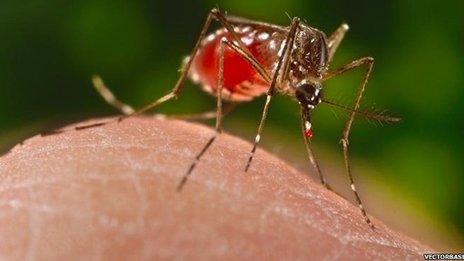Scientists to sequence thousands of insect genomes
- Published

Thousands of insects are being lined up to have their genomes sequenced.
The five-year project will help researchers pinpoint vulnerable regions of insects' genomes, which could be targeted with pesticides.
The project's leaders hope the initiative will make a dent in the $50bn spent globally each year to control diseases transmitted by insects.
The final list of six-legged critters has yet to be finalised.
The project, called the 5000 Insect and Other Arthropod Genome Initiative, comes at a time when the costs of genome sequencing have fallen substantially and it is feasible to cheaply sequence large numbers of animals and plants.
Handfuls of bugs
Among the list of agriculturally important insects and other arthropods - animals with exoskeletons - to be sequenced are handfuls of bugs that act as disease vectors.
By comparing the genomes of these insects with those of their close relatives that don't carry pathogens, researchers hope to pinpoint the genes that make one insect a disease-vector and another not.
What's more, knowing the genes involved will help researchers better predict how insect immune systems will evolve in response to biopesticide control measures, such as Beauveria bassiana, a fungus used to control mosquitoes in malaria-ridden countries in Africa.
It is also hoped that the project will aid the search for suitable compounds for use as pesticides; ones that kill a targeted pest but leave the beneficial pollinating insects that also visit the crop plants unharmed.
- Published27 January 2011
- Published27 August 2010
- Published30 April 2010
- Published5 November 2009